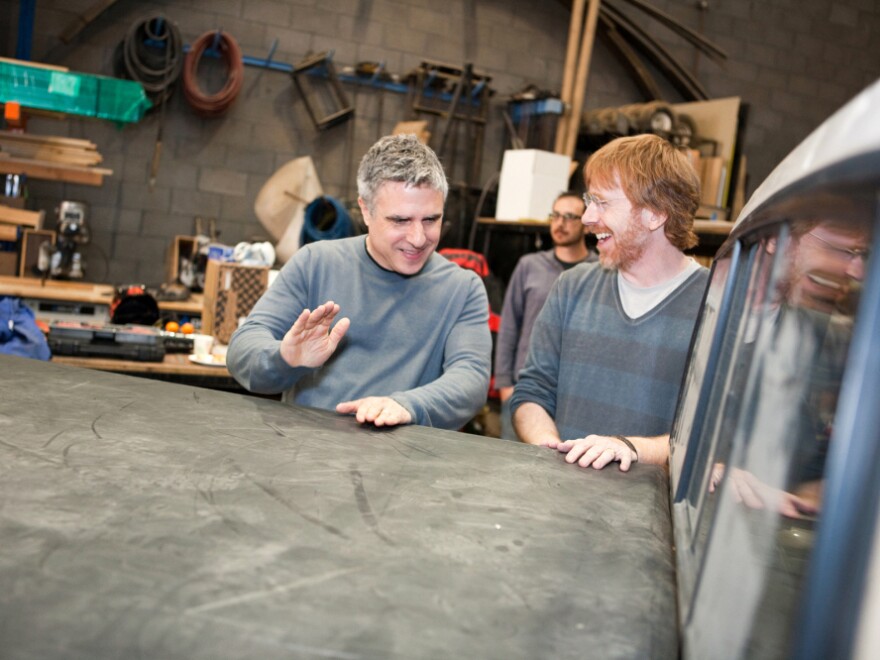About 20 years ago, a Texas car dealership started a competition: Contestants had to keep one hand on a brand-new, fully loaded truck; the last person standing got to keep it.
It may not seem like a gripping drama, but it was the subject of a 1997 documentary. And now, it's the basis of a musical.
It's called Hands on a Hardbody, and that hardbody is, yes, the truck. At a rehearsal at the La Jolla Playhouse in California, it's on casters so the actors can spin it around the stage.
The show's Tony Award-winning director, Neil Pepe, is more accustomed to interpreting the dramas of David Mamet or Harold Pinter.
"It's such an odd challenge as a director," Pepe says, "to have this truck sitting in the middle of the stage."
Pepe isn't the only one of the musical's creators seemingly out of their element. The co-composer is Trey Anastasio of the band Phish (along with co-composer and lyricist Amanda Green), and Benjamin Millepied is the choreographer — he's the former New York City Ballet star who also choreographed the movie Black Swan. Doug Wright, who wrote the script, won a Pulitzer Prize in 2004 for his play I Am My Own Wife.

"When I first started to talk about the musical to friends and colleagues," Wright says, "they said 'Oh, that's an inherently flawed idea, it's a bunch of people standing still for hours on end.' "
An Unlikely Musical
As a documentary, Hands on a Hard Body focuses on people desperate for a truck or for money. In one scene from the film, student Kelly Mangrum explains her motivation.
"The first thing I'd do is sell the truck," she says. "I have so many bills to pay. ... I have a car, wanna go back to school."
In the musical, Mangrum has a different story. She starts a romance with the young guy whose hands are on the truck right beside her. They sing together, fantasizing about winning the truck and getting out of Texas.
"All the musical ideas in the story came from the characters themselves," Anastasio says.
Anastasio tuned into a Southern symphony of country, rock, blues and gospel to compose the musical. One contestant in the documentary, Norma Valverde, listens to religious music to keep going and lapses into states of ecstasy — so Anastasio made the scene a musical number. Valverde's sense of divine connection is — if briefly — catching.
"I feel the joy take my pain away," she sings, banging on the truck and turning it into an instrument.
At this point in the contest, bodies are numb and contestants are sleepless, disoriented and vulnerable; in the documentary, it's clear that contestants were woefully unprepared for the grueling effort of standing for days.
The contest's intense physical demands resonated for choreographer Millepied. He insists it was not a challenge to create dances for people just standing around a truck. He says he was struck by the contestants' trance-like swaying in the documentary as the contest drags on and on.
"Moving, keeping some type of movement," Millepied says, "to keep you awake and also to keep your blood moving on one foot to the other."
'It's A Human Drama'
For Wright, making the contest into a musical was a way to bring lower-income American voices in front of affluent theater audiences.
Wright and his collaborator Amanda Green hired a private detective to find the original contestants, including that woman so transported by religion.
"Norma Valverde is living in the Houston area now," Wright says. "Her kids are all proudly off to college, which is a first for her family."

Wright and Green asked for permission from every real person they turned into a character. And they offered them a financial stake in the show — if it makes any money.
"When you're writing a piece that deals with certain issues of economic exploitation," Wright says, "the last thing you want to do is to be accused of it."
One contestant in the movie and musical who seems likely to win is a young Marine. In this version, he's traumatized by his experience in combat. He sings about the strength he had to learn in war and how it taught him not to fear the future.
The challenge exposes contestants' strengths and frailties as they cling to a shiny symbol of power and mobility. It's summed up in the documentary by a man named Benny Perkins.
"You know, it's a human drama thing," he says. "And it's more than just a contest. And it's more than just winning the truck."
And maybe Hands on a Hardbody is not so different from earlier musicals about vaudeville, strippers or chorus lines. It's about the same thing: competition, hard work and tenacity.
Copyright 2021 NPR. To see more, visit https://www.npr.org.




